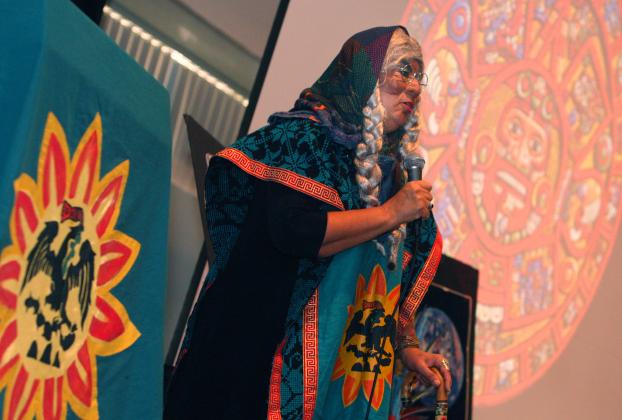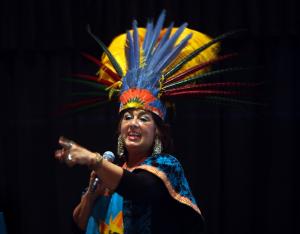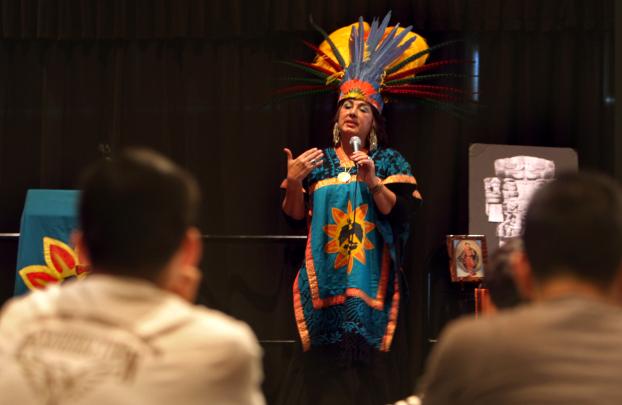 Caption: Maria Elena Ramirez performs her one-woman show, an oral history through storytelling, music and rap about Mexica heritage, colonialism and the importance of humanity, at Cal State Fullerton on Dia de La Raza Oct. 12 as part of Chicano/Latino Heritage Month. Photos by Karen TapiaDownload Photo
Caption: Maria Elena Ramirez performs her one-woman show, an oral history through storytelling, music and rap about Mexica heritage, colonialism and the importance of humanity, at Cal State Fullerton on Dia de La Raza Oct. 12 as part of Chicano/Latino Heritage Month. Photos by Karen TapiaDownload Photo
Mexica Oral History
Students Get Lesson on Indigenous Peoples, Colonialism and Humanity
Performance artist Maria Elena Ramirez delivered a lesson on the heritage of the Mexica (pre-Columbian people of the Americas), colonialism, and the importance of culture and humanity, during Dia de La Raza Oct. 12 on campus.
 Caption: Maria Elena Ramirez performed as a "Roots Woman" and as a Mexica high priestess.
Caption: Maria Elena Ramirez performed as a "Roots Woman" and as a Mexica high priestess.
She told the history of the Aztecs and other indigenous people through the eyes of a “Roots Woman” and a high priestess. She spoke and rapped to music, delivering her feminine perspective on the past 519 years in the Americas. Ramirez was invited to perform as part of Cal State Fullerton's celebration of Chicano/Latino Heritage Month.
Before Christopher Columbus, she said, more than 70 percent of the indigenous nations were peaceful and matriarchal. The Spanish invasion of 1492 ushered in genocide, disruption of Native values, patriarchy and a legacy of violence against women and children that “haunt us to this day,” Ramirez said. “It is prophesied that in this current era of what the Aztecs call ‘El Sexto Sol’, The Sixth Sun, female power and harmony will re-emerge.”
“Forget your roots, and you’re lost,” she told audiences of mostly students during two performances. “Your roots go deep into this Earth. You poison the Earth, you poison yourselves. ... I see one humanity, rainbow warriors, reflecting Mother Earth’s diversity. We need to unite and fight for the human race.”
Ramirez, of Chicana, Puerto-Rican and Apache ancestry, ended her presentations with words of encouragement for the students.
“It’s time to decolonize your mind,” she said. “If you are a seeker of knowledge, complete college. It’s not a white thing, it’s the right thing. A good education is a human right. Develop your mind, your body, your soul. Let’s really make that our No. 1 goal. You have something to give.”
 Caption: Students were treated to two performances by Maria Elena Ramirez. Photo by Karen TapiaDownload Photo
Caption: Students were treated to two performances by Maria Elena Ramirez. Photo by Karen TapiaDownload Photo
October 13, 2010
